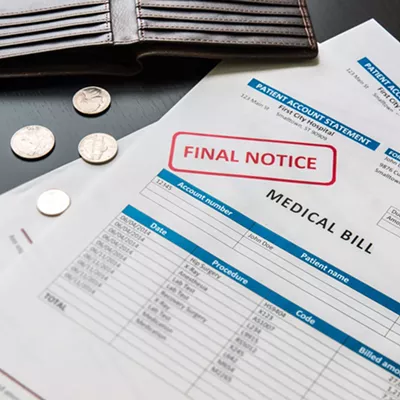
Staff at child care centers face many challenges, including occupational burnout, lack of mental health support, funding concerns and lack of professional development to address students with behavioral issues. The COVID-19 pandemic amplified these challenges, yet child care centers still faced the same issues as life returned to a new normal.
The challenges didn't go unnoticed by Kerra Bower, who owns and operates the Little Scholars Development Center at the edge of the Emerson/Garfield and West Central neighborhoods in Spokane, just off Northwest Boulevard and Monroe Street.
Bower began her child care career in 2013 as an in-home day care provider, hosting children and staff in her own home, which helped her understand the complexity of the needs of children from the South Hill to North Spokane.
"I realized that we really needed to adjust our expectations for our students that come from what we perceived as various points of trauma, and [make] sure that we are providing that social-emotional support," Bower says.
Five years after opening the in-home program, Bower opened the Little Scholars Development Center.
Prior to the pandemic, she began to notice mental health issues among her teachers. She quickly saw a significant turnover rate among her teachers and within the community, which worsened during the pandemic.
The turnover and burnout alarmed Bower because the rate was on a level she had never experienced before. She felt the community of Spokane didn't properly support child care and education workers, so she quickly began to look for resources.
"I started looking within the community to see what I could find for my teachers' mental health, and I found nothing," Bower says. "Everything was really focused on ... the students."
Bower also realized that many students were exhibiting "extreme" behaviors stemming from challenges during the pandemic, which motivated her to find a way to address mental health challenges for both students and teachers in the classroom.
With funding from Spokane County, Bower has been able to pilot a new mental health program for early learning centers over the last year and a half, and both students and teachers are benefiting.
MENTAL HEADSTART
In June 2022, Bower started advocacy work with the Spokane Alliance, a nonprofit and nonpartisan alliance of community groups that works for social change. Bower started pushing for mental health support in early learning and child care centers.
There are a multitude of mental and behavioral challenges in the classroom that Bower felt a program could address, from students with undiagnosed ADHD to those who weren't behaviorally adapted due to limited socialization during pandemic restrictions. A mental health program would also be able to help teachers suffering from PTSD, anxiety or depression.
She invited the Spokane County Board of County Commissioners to visit her center to see the need. Then, on Dec. 6, 2022, the commissioners gave the Little Scholars Development Center and two other child care centers — Parkview Early Learning and A Bright Beginning — $316,500 to start a mental health pilot program. The one-year grant was funded by the 0.1% mental health sales tax that's levied in the county.
Bower quickly assembled a "skeleton" program, hiring a team of nine that includes licensed mental health clinicians, behavioral health technicians, and nurse practitioners. She then worked with community resource coordinators to develop a robust program.
The team provides mental health services for more than 300 students and 75 early learning child care providers. Bower says they quickly learned they can provide services for less than the amount issued for the one-year pilot, so they've been able to keep it going.
Teachers are the front line for observing behavioral issues with students, Bower says, but they are often ignored when addressing mental and social behavioral health solutions. This pilot program is unique in that it is teacher-led, allowing the teachers to develop the classroom dynamics with the support of mental and behavioral clinicians.
Therapists can help determine whether issues (for a student or teacher) stem from personal or professional stressors, or other clinical or behavioral issues, and can observe in the classroom, helping develop plans for teachers to address concerns with a specific student. A classroom management specialist may also be required to determine whether class structure, student engagement or routine needs to be addressed.
"They'll sit down and talk with the teacher about what their pressures and stressors are with that particular student or with that particular situation," Bower says. "And then we implement a plan."
Bower says that what separates the mental health pilot program from other educational programs is the implementation and support of teacher plans, with help from the team of professionals. The teacher will receive support for two weeks to help make the necessary adjustments to the classroom.
Classroom management specialists can demonstrate the ideal classroom environment to the teacher. A behavioral clinician will also help identify the teacher's classroom triggers and remind them of the resources available to address student behaviors effectively. The guidance can range from engaging a student with a new curriculum plan to adding student activities and visual aids that serve as a reminder of concepts taught in the classroom.
SELF-CARE
The pilot program has also focused on teacher self-care, so they can address stress that's affecting their work and be effective with their students. During the initial intake with a program therapist, the teacher can have an "on-the-clock" therapy session to address personal or professional issues.
Personal therapy sessions can be adjusted depending on the teacher's needs. Bower says the program has even provided family therapy sessions for an employee with issues at home.
After conducting sessions with teachers, the mental health staff can advocate on their behalf to address factors affecting their mental well-being. Bower points to a recent situation in which therapists identified stressors concerning teachers' personal finances. The program conducts payroll monthly, which creates stress for staff who deal with bills throughout the month.
"As a conversation, the team decided that they wanted financial management support," Bower says.
With community help, she now provides support with budgeting, banking basics and managing unplanned life events as a benefit for her staff. Looking at the whole person is essential, she says, and everything that happens outside of the classroom can impact the teacher within the classroom, so providing a "village" of support for the teachers is important for Bower.
FINISH LINE
Bower says the long-term effects of mental wellness in the classroom are boundless. Students can build their emotional intelligence and maneuver through social settings in larger classrooms as they grow.
"I think that it's really important for all of our students, regardless of where they come from, to know that they have it within themselves to regulate those emotions," Bower says. "And if they're having any difficulty, then there are safe people around them that are also able to help."
Bower is preparing to provide a year-end report to the Spokane County commissioners and is excited to detail the uptick in teacher satisfaction. While it takes time to build momentum, Bower says the results so far show the program is helping.
The program observed a 40% reduction in behavioral-related injury and incident reports at one of the child care centers in the first six months, Bower says. Parents with children in the program have also voiced a positive response due to improved behaviors among their children.
The program is also documenting simple improvements, such as being able to focus, walk down a line in a hall and self-recognize frustrations.
Bower says one young student with behavioral problems made it unsafe to be in the child care center, but after about six months, with resources and a focused plan, the child was able to get kindergarten-ready.
With the positive behavioral changes observed in students, there is hope for continued funding by the county and other partnerships within the community. Bower hopes that new partnerships can potentially help develop the program even further.
"We're really looking for our community as a whole to step up and say this is something that matters and to support and provide funding," Bower says. "I just think that the teachers that are in these classrooms do just incredible work. And it really is time that our community rallies around them and ensures that they are supported." ♦
























